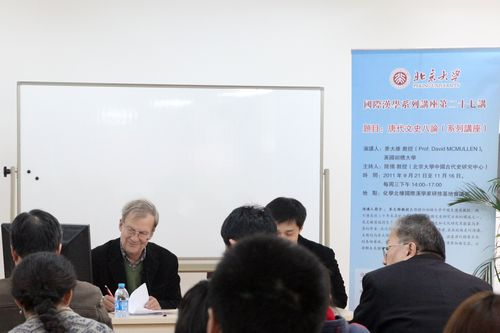Peking University, Nov. 18, 2011: Invited by Peking University Sinology Academy, Professor David McMullen, sinologist of Cambridge University, visited Peking University from Semptember to November in 2011, during which he gave 8 special lectures, all focusing on literature and history of Tang Dynasty (618~907). His lectures with their various themes ranging from history of thought, politics to that of literature, covering manifold layers of elite culture of Tang Dynasty, attracted lots of faculty members and students from Peking University, Tsinghua University and Renmin University.
As a renowned sinologist, Professor McMullen through his lectures proved his erudition. His lectures exuded the profound literary tradition of Cambridge University. With fluent Chinese and a strong sense of humor, Professor McMullen was capable of seeing big things through small ones. For example, based on the imperial edict implemented by Emperor Xuanzong in Pratt County after An Shi Rebellion (755~762), Professor McMullen explained the emperor’s political view and his attitude towards feudalism in his later years. Moreover, through this, he went on to sort out the relationships between Tang Dynasty and other specific historical contexts related to feudalism.

He paid close attention to the studies on political culture and court manners. By studying the poems of Emperor Xuanzong, he arrived at two conclusions: supporting literature was a part of the Emporer’s soft power; the original number of his poems needed to be reestimated taking into consideration the way of conservation and how they were handed down. Besides text-analysis, Professor McMullen was also specialized in reconstructing the originally dynamic and delicate political atmosphere through subtle historical details which used to be taken for granted.
Although faraway from China in England, Professor Mcmullen closely watched unearthed relics in China out of his concern for the significance of epitaph on historical studies on Tang Dynasty. From Yuan GongYu’s epigraph by Di Renjie, for example, with other resources, Professor McMullen restudied Di’s political stand and actions and pointed out divergences and even oppositions between historical reality and later generations’ appraisal of him.
Scholars from Peking University, Renmin University, Minzu University and the Chinese Academy of Social Sciences also participated in the lectures. They shared their views on Cambridge University’s tradition of sinology studies represented by Professor McMullen.
Written by: Shi Hui
Edited by: Liu Lu
Source: PKU News (Chinese)